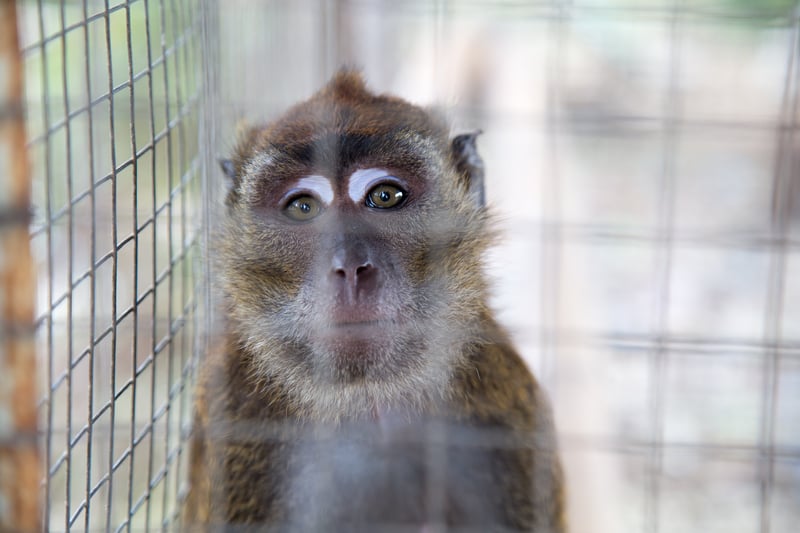
More Than 30,000 Monkeys Sold Each Year to the US, Largely for Animal Testing
Blog
The United States has been using large numbers of endangered long-tailed macaques for lethal pharmaceutical testing since the 1970s.
Long-tailed macaques, considered the most heavily traded primate species in the world, are in such high demand by the biomedical industry that a single animal could be sold for as much as $60,000. But, the cost of trafficking these animals from the wild to live in cages and face cruel experimentation is much higher.
Since the US biomedical industry switched from rhesus macaques to long-tailed macaques, wild populations declined 40 percent from the mid-1980s to 2006. The International Union for the Conservation of Nature (IUCN) listed the species as endangered in 2022 due to several causes including habitat loss, the pet trade, subsistence hunting, and capture for biomedical research. A staggering 60 percent of the more than 400,000 long-tailed macaques exported from Asia in the 2010s were transported to the United States, meaning the US is complicit in trafficking these animals for the global wildlife trade.
While most long-tailed macaques imported by the US are identified as captive-bred on paper (billions of wild animals are bred in commercial wildlife farms every year), some experts believe that many of those in US labs have actually been trafficked from the wild as the illegal trade in wild-caught macaques is widespread. In fact, more than 1,000 wild long-tailed macaques from Cambodia were smuggled into the United States under false permits labeling them captive-bred, with several individuals indicted for the smuggling scheme in 2023. Additionally, the Department of Justice estimates that more than 2,600 wild macaques entered the US lab system with false permits from 2018-2022.
The same year the IUCN listed the monkeys as endangered, a petition for rulemaking was submitted to the US Fish and Wildlife Service to add long-tailed macaques to the US Endangered Species Act, which establishes protection for fish, wildlife, and plants listed as threatened or endangered. The law, which was established in 1973, also implements the provisions of the Convention on International Trade in Endangered Species of Wild Flora and Fauna (CITES). The petition has yet to be approved.
World Animal Protection US Executive Director Lindsay Oliver, who worked as an undercover investigator exposing cruelty in animal laboratories, said on LinkedIn:
“Endangered or not–capturing animals from the wild is wrong. Using them for experimentation is wrong. These intelligent and playful animals are subjected to traumatic experiments causing significant harm.”
“While the demand for long-tailed macaques in labs has surged, their populations in the wild have dwindled, due to illegal trade. We shouldn’t need an Endangered Species Act to protect animals from being stolen from their homes, but here we are.”
Tens of thousands of monkeys are imported a year to study infectious diseases, the brain, and the creation of new drugs, according to the US National Association for Biological Research. Recently, a macaque who was going to be used for stem-cell research tested positive for latent tuberculosis (TB), rendering the entire shipment “unusable” by Jonah Sacha, a researcher at Oregon Health and Science University. While it’s possible the macaque contracted TB in captivity from a human, it’s more likely that the monkey was taken from the wild where TB is relatively common among populations.
Laboratories that use long-tailed macaques require “pathogen-free primates in good condition” in order to carry out their experiments, but with prices per monkey skyrocketing up to $60,000 after the pandemic, it’s more enticing for traffickers to catch them from the wild and launder the shipments.
Because the species is listed as endangered by the IUCN, the United States requires special import permits. However, Cambodia’s exports of long-tailed macaques tripled from 10,000 monkeys in 2018 to 30,000 in 2019 and 2020, leading researchers to suspect that the country is capturing them from the wild. Cambodia “has historically been incapable of producing second-generation offspring macaques, [and] therefore increasing their production capacity legally seems unlikely.”
COVID-19, which many scientists believe sprang from an illegally trafficked wild animal, raises alarm bells that this exploitative industry could put all of us at future risk of another pandemic. More than 70% of emerging zoonotic infectious diseases come from wildlife.
Anne-Lise Chaber, an illegal wildlife trade researcher at the University of Adelaide in Australia, told The Guardian:
“Macaque breeders or sellers are housing thousands of animals in tiny crates in close proximity, creating the right conditions for the next pandemic: it is a pathogen bomb … The irony is that this production of macaques is mainly aimed at providing animals for biomedical research to create vaccines for current outbreaks.”
For the protection of animals, our own health, and the health of our planet, we need to fundamentally change our relationship with animals.
In fact, in the United States, both Democratic and Republican legislators signed a letter calling on the National Institutes of Health to support alternatives to harmful animal testing. While the letter, signed by 19 legislators across the aisle, specifically calls out the cruel conditions dogs and cats go through in animal testing, World Animal Protection implores the United States government to look at all forms of animal testing, no matter the species or where those animals came from.
Whether a painful experiment is conducted on a dog, a long-tailed macaque, a cat, or a fish, either captive-bred or wild-caught, every animal deserves to live free from cruelty—and that includes no longer being used in animal testing.